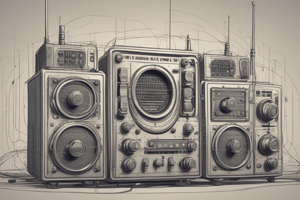Podcast
Questions and Answers
What is the purpose of the transformer rectifier unit (TRU) in an airborne HF communication system?
What is the purpose of the transformer rectifier unit (TRU) in an airborne HF communication system?
- To convert AC output to DC power (correct)
- To amplify the carrier wave
- To detect HF radio waves
- To modulate the signal wave
What determines the resonant frequency of an antenna?
What determines the resonant frequency of an antenna?
- The power of the transmission signal
- The frequency of the carrier wave
- The length of the antenna element (correct)
- The type of antenna used
What is the purpose of the antenna tuner in the airborne HF communication system?
What is the purpose of the antenna tuner in the airborne HF communication system?
- To detect the signal wave
- To amplify the transmission signal
- To modulate the carrier wave
- To adjust the resonant frequency and perform impedance matching (correct)
What type of antenna is used for VHF and UHF equipment?
What type of antenna is used for VHF and UHF equipment?
What is the function of the side tone circuit in an airborne HF communication system?
What is the function of the side tone circuit in an airborne HF communication system?
What is the frequency range of the airport surface detection equipment (ASDE)?
What is the frequency range of the airport surface detection equipment (ASDE)?
What is the capability of mode S in a secondary surveillance radar (SSR) system?
What is the capability of mode S in a secondary surveillance radar (SSR) system?
What is the frequency range of a VOR (VHF Omnidirectional Range)?
What is the frequency range of a VOR (VHF Omnidirectional Range)?
Flashcards are hidden until you start studying
Study Notes
Radio Equipment Power
- Radio equipment requires DC power to operate.
Transformer Rectifier Unit (TRU)
- AC output of the engine driven generator is converted to DC by the TRU.
- TRU consists of a transformer, a rectifier, and a smoothing circuit.
Antenna Characteristics
- The resonant frequency of an antenna is determined by the antenna element length.
- The antenna's characteristic (resonant) frequency is electrically adjustable.
- Insertion of coils in antenna elements lowers the resonant frequency.
- Insertion of capacitors makes the resonant frequency higher.
Antenna Tuner
- Airborne HF communication system has an antenna tuner in the antenna circuit.
- The antenna tuner adjusts the resonant frequency and performs impedance matching.
Antenna Types
- Sleeve antenna, Brown antenna, and Yagi antenna are used for VHF and UHF equipment.
- Yagi antenna is a directional antenna.
Ionosphere and HF Communication
- The F layer in the ionosphere reflects HF radio waves.
- HF communication quality can be deteriorated by magnetic storm, Dellinger phenomenon, and fading depending on the strength of Sun's activity.
Radio Wave Transmission
- A carrier wave is generated by an oscillator.
- The carrier wave is modulated with a signal wave (audio), and the modulated carrier wave is amplified to the required power for transmission.
Side Tone Circuit
- The side tone circuit allows pilots to monitor their own transmission.
- Transmission signal is partially fed back to the receiving system for this purpose.
Radar Frequencies
- Detection capability of a high-frequency microwave is excellent, but its attenuation is high.
- The airport surface detection equipment (ASDE) operates on SHF (Super High Frequency).
- The air route surveillance radar (ARSR) and the airport surveillance radar (ASR) operate on UHF.
SSR Modes
- SSR mode A is capable of discriminating a "squawk" code selected on the aircraft's transponder panel.
- Mode C has a capability of automatic altitude reporting.
- Mode S is capable of addressing a single specific aircraft with its unique mode-S address.
Navigation Systems
- VOR operates on VHF, providing excellent accuracy of bearing but with limited coverage to line of sight.
- DME is commonly co-located at VOR stations to provide aircraft with bearing and distance information.
- RNAV routes are established along waypoints based on the bearing and distance information from VOR/DME.
ILS Components
- Basic ILS components are a localizer for lateral guidance, a glide slope for vertical guidance, and marker beacons for position information.
MTSAT and Satellite-Based Augmentation System
- MTSAT provided SBAS (Satellite-Based Augmentation System) for improved accuracy and reliability of GPS navigation.
- MTSAT also provided Controller Pilot Data-Link Communication (CPDLC) and Automatic Dependent Surveillance (ADS) for oceanic flights.
- SBAS function is being transferred to QSS (Quasi-Zenith Satellite System).
INMARSAT Communication
- The quality and coverage of communication by INMARSAT are much better than HF voice communication, except in polar regions.
Studying That Suits You
Use AI to generate personalized quizzes and flashcards to suit your learning preferences.

